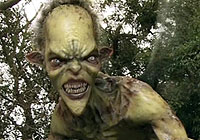 The Torchwood episode “Small Worlds” focuses on “fairies” – which are viewed not as alien entities but as ones that are native to our world and have been around for as long as or longer than humans have. Indeed, they once were human children, but have been transformed into immortal beings who can flit in and out of and backwards and forwards in time. Some think of them as lovely and benevolent, but a close look reveals that they are capricious and do not care about harm done to others.
The Torchwood episode “Small Worlds” focuses on “fairies” – which are viewed not as alien entities but as ones that are native to our world and have been around for as long as or longer than humans have. Indeed, they once were human children, but have been transformed into immortal beings who can flit in and out of and backwards and forwards in time. Some think of them as lovely and benevolent, but a close look reveals that they are capricious and do not care about harm done to others.
Even Jack, who has encountered them before, has no way of dealing with them. He emphasizes that it isn’t a matter of police work or science, and one might add that there is no Doctor to come up with some clever solution.
 These “fairies” are powerful beings who treat everything as a game, live forever, and are unstoppable. The only thing one can do, Jack concludes, is give them what they want and hope that they will reciprocate by leaving you alone.
These “fairies” are powerful beings who treat everything as a game, live forever, and are unstoppable. The only thing one can do, Jack concludes, is give them what they want and hope that they will reciprocate by leaving you alone.
It struck me hard as I thought about the episode that this is exactly how gods were understood, and what religion meant, throughout most of human history.
And so I strongly recommend “Small Worlds” as a discussion-starter on religion and science fiction. It also provides a good starting point for discussion of religion and science. The progress of our scientific knowledge has eliminated the mythological element to forces of nature. That makes them intelligible, and slightly more predictable, but not necessarily less terrifying, since there is no personal entity behind them that we can appease to keep them at bay. But presumably just understanding that offering sacrifices will not keep tornados at bay is progress, and reality is preferable to comforting falsehoods.
There is a lot of updating that any viable religious viewpoint must engage in if it is to seem plausible to present and future generations. As Carl Sagan wrote, “In fact a general problem with much of Western theology in my view is that the god portrayed is too small. It is a god of a tiny world and not a God of the galaxy, much less of a universe… I don’t propose that is a virtue to revel in our limitations. But it’s important to understand how much we do not know. There is an enormous amount we do not know; there is a tiny amount that we do. But what we do understand brings us face to face with an awesome Cosmos that is simply different from the Cosmos of our pious ancestors.”
Our cosmos is bigger than many ancients realized, and more rational and intelligible too, and less full of capricious spirits. And so the really interesting theological questions are not about the attempts of fundamentalists to maintain the same ideas of God today. Rather, the crucial debate is about whether our progress in understanding the world leads to a bigger God, or none at all.












